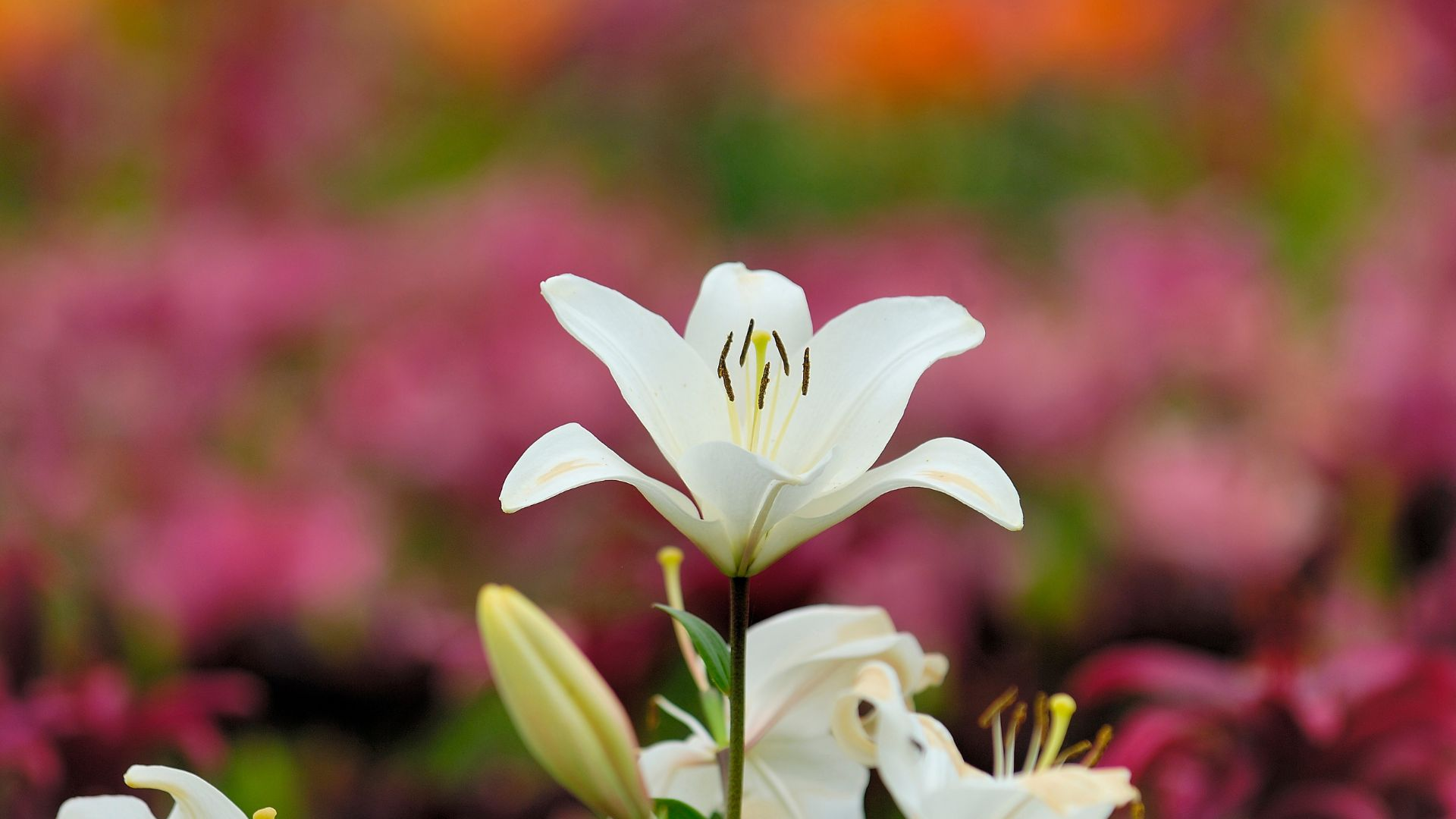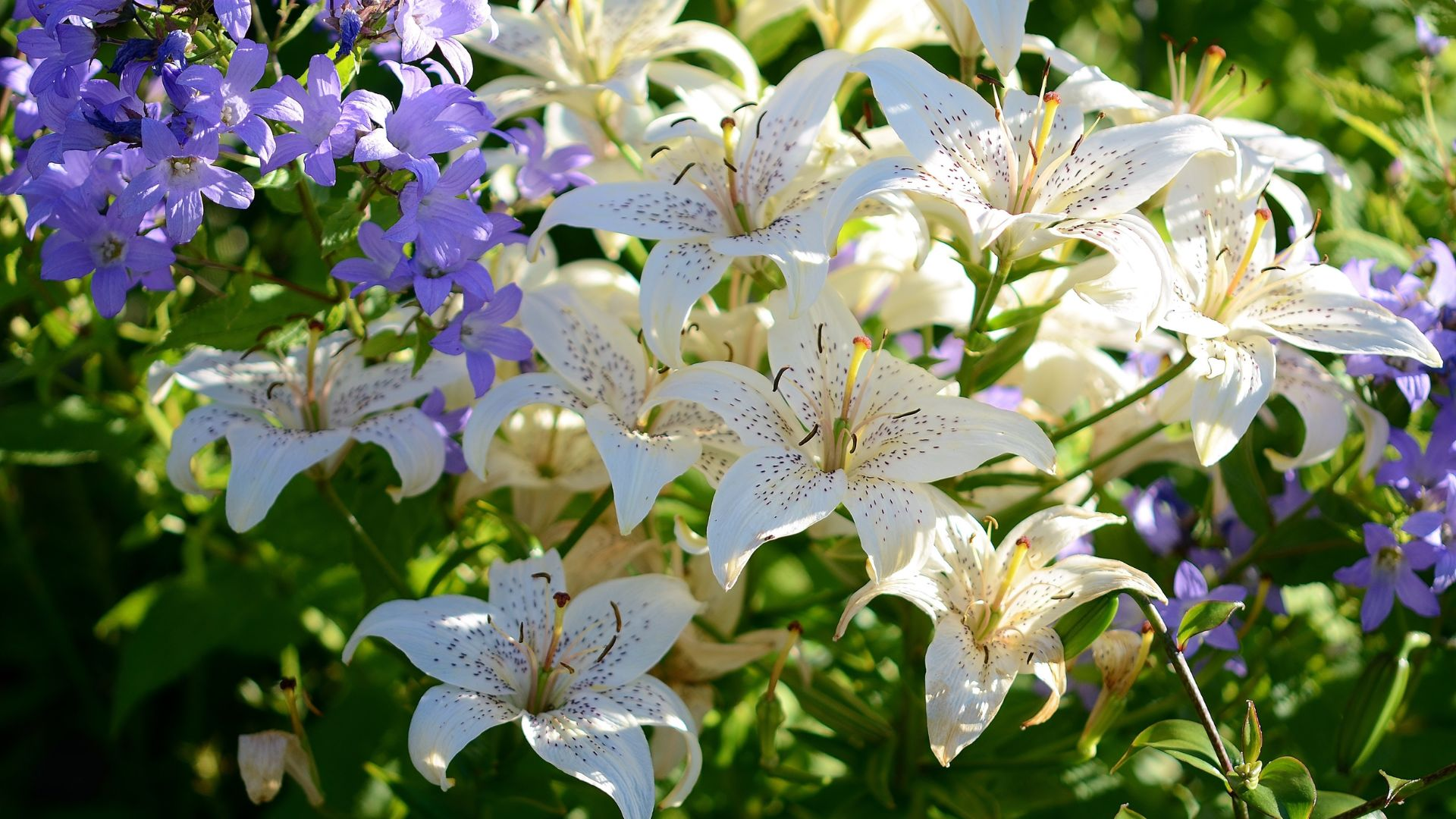Lilies, with their exquisite beauty and captivating fragrance,hold deep symbolic meanings in various cultures throughout history. From ancient Greek mythology to Christian traditions, Chinese customs, Japanese rituals, and Victorian symbolism, lilies have represented purity, love, divinity, and rebirth.
In this exploration of lilies' symbolism and meanings in different cultures, we delve into the fascinating world where these elegant fragrant flowers transcend mere botanical beauty to embody profound concepts and convey messages of spiritual significance.
Join us as we unravel the rich tapestry of cultural interpretations surrounding lilies, revealing the universal allure and timeless significance of these remarkable blooms. If you want to order lilies, make sure you read this one!
Lilies as Symbols of Purity and Divinity: Exploring their Spiritual Significance
Lilies have long been regard as powerful symbols of purity and divinity in various cultures and spiritual traditions. Their exquisite beauty, delicate sweet fragrance, and association with religious tales and mythology have contributed to their significant spiritual significance. So, let's explore the spiritual symbolism of lilies further. If you want to order lilies, make sure to read this!
Purity and Innocence
Moreover, lilies are symbols of resurrection and rebirth, intricately connected to their seasonal nature. These stunning flowers frequently bloom in spring, emerging after a period of dormancy in winter. In Christian traditions, the Easter Lily symbolizes the resurrection of Jesus Christ, signifying his triumphant victory over death and the assurance of eternal life.
Divine Femininity
Lilies are often associate with divine feminine energy and are frequently link to goddesses and female deities. In Greek mythology, lilies are associate with Hera, the queen of gods and goddesses, symbolizing her purity and motherhood. In Christian iconography, lilies are closely associate with the Virgin Mary, symbolizing her purity and immaculate conception.
Resurrection and Rebirth
Furthermore, lilies hold significant symbolism as representations of resurrection and rebirth. Additionally, this symbolic association is deeply intertwined with their seasonal nature. Lilies frequently blossom in the springtime, emerging after a period of dormancy throughout the winter.
Meanwhile, in the realm of Christian traditions, the Easter Lily serves as a powerful symbol. Also, representing the resurrection of Jesus Christ and his ultimate triumph over death, carrying the profound promise of eternal life.
Spiritual Illumination
Lilies are sometimes associate with spiritual illumination and enlightenment. The upward-reaching stance of the lily flower towards the sun has been interpret as a metaphor for the soul's yearning for divine enlightenment and the pursuit of higher spiritual realms.
Spiritual Purity and Devotion
Lilies are consider sacred flowers in various spiritual practices, representing purity, devotion, and spiritual enlightenment. In Buddhism, the white water lily (Nymphaea alba) holds a special place as a symbol of spiritual purity and enlightenment, often depicted in artworks alongside Buddha. The lotus, a close relative of the lily, also holds similar symbolic significance in Eastern spiritual traditions.
Heavenly Blessings
In many cultures, lilies are believe to attract positive energies and heavenly blessings. They are often use as offerings in religious ceremonies, rituals, and altars to invoke divine favor and protection.
Overall, lilies carry a profound spiritual significance across different cultures and belief systems. Moreover, their association with purity, divinity, rebirth, and enlightenment makes them a powerful symbol for those seeking spiritual growth and connection with the sacred.
Embrace the diversity of lilies and let their enchanting presence enhance your floral landscapes, creating moments of joy and wonder. Order lilies online with Stemmz!
Cultural Significance of Lilies: Symbolism and Meanings in Eastern Traditions
Lilies hold significant cultural symbolism in Eastern traditions, with deep meanings intertwined with the region's diverse cultures. Let's explore the cultural significance of lilies in Eastern traditions and how they are symbolize.
Chinese
Firstly, in Chinese culture, lilies are highly revere as auspicious symbols, associate with wealth, purity, and abundance. Then, the Chinese name for lily, "bǎi hé," shares a phonetic similarity with the phrase meaning "hundred accomplishments" or "hundred happiness." Finally, lilies appear in Chinese art and literature, symbolizing elegance, beauty, and harmonious relationships.
Japanese
Similarly, in Japanese culture, lilies hold profound symbolism, particularly in the traditional art of Ikebana. The Japanese word for lily, "yuri," conveys notions of purity, renewal, and fertility. Moreover, lilies contribute to the graceful and harmonious compositions in Ikebana, representing the transient nature of life. Consequently, the annual Lily Festival in Japan celebrates the beauty of lilies, showcasing various lily flowers varieties.
Korean
Furthermore, lilies possess cultural significance in Korean traditions, associated with nobility, good fortune, and prosperity. Traditional Korean weddings incorporate most lilies as decorative elements, symbolizing purity and a blessed union. Lilies embody notions of feminine beauty and grace, admired for their delicate and elegant appearance.
Indian
In the context of Indian culture, lilies hold a symbolic presence, particularly in religious symbolism and mythology. On the other hand, in Hinduism, the closely related lotus flower holds great spiritual significance. In addition, lilies, associated with the lotus, symbolize purity, divine beauty, and enlightenment. Hindu deities often hold lotus flowers, considered sacred symbols of transcendence and spiritual awakening.
Thailand
Similarly, in Thailand, lilies are revere for their symbolism, which is associate with purity, humility, and the pursuit of enlightenment. In addition, the Thai name for lily, "dok kra jiao," translates to "flower of the noble-hearted." Consequently, lilies embody beauty and is commonly offer in Buddhist temples as a gesture of reverence, seeking blessings.
The cultural significance of lilies in Eastern traditions reflects their enduring beauty, purity, and profound symbolism. Also, they symbolize prosperity, elegance, spiritual awakening, and harmonious relationships, enriching the cultural tapestry of these diverse regions.
So, If your looking for wedding flowers or other ceremonies, lilies are perfect for the occasion! Order lilies for delivery with Stemmz today.
Lilies in Western Culture: Representations of Innocence, Love, and Remembrance
In Western culture, lilies hold significant representations of innocence, love, and remembrance. These exquisite flowers have captured the imagination and emotions of people throughout history, inspiring various cultural associations.
One of the primary representations of lilies in Western culture is innocence. With their pristine white petals, lilies symbolize purity and untainted beauty. Also, they are often use in religious ceremonies, such as baptisms and weddings. This is to signify the purity of the soul and the beginning of a new chapter in life.
Additionally, other lilies are commonly associate with the innocence of children, and they are often include in imagery and artwork representing the purity and vulnerability of youth.
Lilies are also strongly link to love and romance. Also, their elegant form and enchanting fragrance make them popular choices for bridal bouquets and romantic gestures.
The association between lilies and love can be trace back to ancient Greek and Roman mythology, where lilies were connect to goddesses of love, such as Venus and Aphrodite. In this context, lilies symbolize romantic love's purity, beauty, and passion.
Lilies in Western Culture
Furthermore, lilies have a significant role in remembrance and mourning. They are often include in funeral arrangements and memorial services as a symbol of the departed's innocence and the hope of eternal life. Moreover, white lilies, in particular, are commonly associate with funeral rituals, where they serve as a poignant reminder of the purity and transcendence of the soul.
In art, literature, and popular culture, lilies continue to symbolize innocence, love, and remembrance. Also, their timeless beauty and powerful symbolism have made them enduring motifs in Western culture, evoking emotions and capturing the imagination of those who encounter them.
Whether in religious contexts, romantic gestures, or moments of mourning, lilies are powerful symbols representing the profound aspects of human existence. If you want to order lilies online, make sure to check our collections!
Lilies in Ancient Egyptian Mythology: A Connection to the Divine and the Afterlife
In ancient Egyptian mythology, lilies held a significant place, representing a connection to the divine and the afterlife. The ancient Egyptians revered lilies for their symbolism and incorporated them into their religious beliefs and rituals. So, Let's explore the role of lilies in ancient Egyptian mythology.
The blue water lily, specifically the Nymphaea caerulea, was central to Egyptian mythology. This lily, also known as the "Blue Lotus," was highly regard for its beauty and enchanting fragrance. It grew abundantly along the banks of the Nile River and the sacred waters of ancient Egypt.
The blue water lily was closely associate with the sun god Ra. One of the most prominent deities in the Egyptian pantheon. Also, it is believe that the flower bloomed each morning as "Ra" emerged from the underworld, symbolizing rebirth and renewal. This connection to Ra made the blue water lily a powerful symbol of resurrection and the eternal cycle of life.
Moreover, the blue water lily was link to the afterlife and the journey of the soul. It was believed that the flower's sacred essence could provide spiritual enlightenment and guide the deceased on their passage through the underworld. In addition, the blue water lily featured prominently in funerary rituals, with its petals often depicted on burial tombs and coffins.
Lilies in Ancient Egypt
The significance of lilies in ancient Egyptian mythology extended beyond their association with Ra and the afterlife. Additionally, they were also connected to fertility and creation. The blue water lily was seen as a manifestation of the goddess Isis, who was revered as the divine mother and the giver of life. Consequently, lilies were believed to symbolize the creative powers of the goddess and were frequently used in fertility rituals and offerings.
The presence of lilies in ancient Egyptian art and architecture further reflects their importance in the culture. In addition, lilies adorned the walls of temples and tombs, and they were depicted in paintings and hieroglyphics, symbolizing the divinity and eternal nature of the gods.
In conclusion, lilies, especially the blue water lily, held profound significance in ancient Egyptian mythology. They represented a connection to the divine, particularly the sun god Ra, and played a crucial role in the belief system surrounding the afterlife and rebirth.
Lilies were symbols of spiritual enlightenment, fertility, and the creative powers of the goddess Isis. Also, their prominence in ancient Egyptian culture underscores their enduring significance in the mythological and religious traditions of this ancient civilization.
Buy lilies online with Stemmz today! By choosing Stemmz, you can enjoy the convenience of online shopping, the assurance of high-quality flowers, and the expertise of skilled florists. So, whether it's a birthday or a special celebration, Stemmz can provide you with the perfect lily bouquet to make the occasion memorable and enchanting. Order lilies with us today!
The Symbolism of Lilies in Chinese Culture: Prosperity, Longevity, and Harmonious Relationships
Lilies hold significant symbolism in Chinese culture, symbolizing prosperity, longevity, and harmonious relationships. These elegant flowers, with their vibrant colors and graceful appearance, are associated with wealth and good fortune. In Chinese culture, lilies are believed to bring multiple blessings and prosperity to one's life due to their resemblance to the phrase "bai he bai ji," meaning "100 kinds of blessings."
Additionally, lilies are associated with longevity and immortality, as Chinese mythology tells of the "Elixir of Life" brewed from the petals of the lily flower. Also, this belief arises from the long lifespan of lilies, with some species living for hundreds of years. Therefore, lilies have become a symbol of enduring vitality and a wish for a long, healthy life. Moreover, lilies are frequently used as a symbol of harmonious relationships, particularly in the context of marriage and love.
Their pure and delicate beauty represents the virtues of purity, innocence, and fidelity. Meanwhile, Chinese weddings often incorporate lilies into floral arrangements, bridal bouquets, and decorations to invoke blessings for a harmonious and lasting marriage. Also, lilies hold such profound meaning that they are commonly depicted in Chinese art and literature, solidifying their significance in the culture.
With their graceful elegance, exquisite fragrance, and profound symbolism, lilies have become cherished flowers in Chinese traditions and celebrations.
Embrace their regal nature and let them take center stage, transforming your garden into a spectacle of awe-inspiring beauty. Experience safe and timely lilies delivery service with Stemmz! Order lilies now.
Lilies in Greek Mythology: Unveiling the Tales of Gods, Goddesses, and Mortals
Lilies play captivating roles in Greek mythology, intertwining with the tales of gods, goddesses, and mortals. Also, these enchanting flowers enrich the narratives, symbolizing various aspects of the ancient Greek stories. Let's embark on a journey into the fascinating world of lilies in Greek mythology:
Birth of the Lily
Greek mythology attributes the origin of lilies to the milk of Hera, the queen of the gods and wife of Zeus. As Hera nursed her son, Hercules, drops of her divine milk fell to the earth, giving rise to lilies. This connection with Hera reveals lilies as symbols of motherhood, nurturing, and divine heritage.
Symbol of Virginity
Lilies often represent purity and innocence in Greek mythology. One notable tale revolves around Hera's jealousy and suspicion of Zeus's infidelity. To test the purity of mortal women who had captured Zeus's affection, Hera would scatter lilies in their path. If the women were pure and untouched, the lilies would remain unspoiled. Also, this symbolism portrays lilies as emblems of virginity and faithfulness.
Connections to Other Deities
Lilies also bear associations with various Greek gods and goddesses. In addition, the goddess Artemis, the guardian of the moon, chastity, and the hunt, frequently adorns herself with lilies. These flowers signify her link to purity and femininity. Additionally, the goddess Aphrodite, epitomizing love and beauty, is connected to lilies as symbols of sensuality and desire.
Mourning and Death
Lilies possess a dual symbolism in Greek mythology, signifying both life and death. They are often intertwined with the realm of the underworld and the goddess Persephone. Moreover, in tales of mourning and loss, lilies commonly feature in funeral rites and as offerings to the deceased. The delicate and ephemeral beauty of the flower serves as a reminder of life's transient nature and the cycle of death and rebirth.
Throughout Greek mythology, lilies captivate as they symbolize birth, purity, connections to deities, and the cycle of life and death. These mesmerizing flowers add depth and intrigue to the rich tapestry of ancient Greek tales, making them enduring symbols within the realm of Greek culture. Order lilies for delivery with Stemmz today.
Types of Lilies: Oriental lilies, Calla lilies, Trumpet lilies, Tiger Lilies, Asiatic Lilies, Daylilies, Easter Lilies, and Stargazer Lilies
Native American Perspectives: Lilies as Symbols of Renewal, Balance, and Connection to Nature
Lilies hold significant meaning in Native American cultures, symbolizing renewal, balance, and a profound connection to nature. These graceful flowers embody the spiritual beliefs and values of Indigenous peoples. So, Let's delve into the Native American perspectives on lilies:
Renewal
Native American cultures view lilies as powerful symbols of renewal. Lilies actively represent the cyclical nature of life, death, and rebirth. Additionally, they serve as constant reminders of the continuous renewal of the natural world and inspire personal growth and transformation. Lilies act as messengers of hope, urging individuals to embrace change and seek personal renewal.
Balance
Lilies are perceived as embodiments of balance and harmony by Native Americans. The flower's elegant form and symmetrical petals reflect the interconnectedness of all things in the natural world. Also, lilies are used in rituals and ceremonies to restore harmony within individuals and communities, fostering equilibrium between physical, mental, and spiritual aspects of life. They remind individuals to seek balance in relationships, actions, and interactions with the environment.
Connection to Nature
Lilies are considered conduits to the natural world in Native American beliefs. They are revered as sacred plants, carrying the wisdom and energy of the natural world. Also, the beauty and fragrance of the flower attract benevolent spirits and enhance spiritual awareness. By cultivating a connection to lilies, individuals strengthen their bond with nature and gain a deeper understanding of their place within the broader web of life.
Within Native American cultures, lilies symbolize renewal, balance, and a profound connection to nature. They remind individuals of the cyclical nature of life and encourage the embrace of change. Furthermore, lilies embody the principles of harmony and interconnectedness, urging individuals to seek balance within themselves and their surroundings.
By embracing the symbolism of lilies, Native Americans honor their ancestral traditions and cultivate a deeper sense of spirituality and reverence for the natural world.
If you're looking for a reliable and hassle-free lilies bouquet delivery service, contact us! Order lilies today.
Lilies in Japanese Art and Poetry: Beauty, Elegance, and Transience
Lilies hold a significant place in Japanese art and poetry, symbolizing beauty, elegance, and transience. These captivating flowers have inspired artists and poets for centuries, capturing their essence in various art forms. Let's explore the symbolism of lilies in Japanese culture:
-
Beauty: Lilies celebrate their inherent beauty in Japanese art and poetry. With their delicate petals, vibrant colors, and graceful form, they evoke a sense of aesthetic appreciation. Artists depict lilies in paintings, ceramics, and textiles, showcasing their exquisite beauty. Poets incorporate lilies into their verses, using vivid imagery to convey the captivating allure of these flowers.
-
Elegance: In Japanese art and poetry, lilies embody elegance. Their slender stems and graceful blossoms exude a sense of refinement and sophistication. Artists portray the elegance of lilies through intricate brushwork and delicate compositions. Also, poets use lilies as metaphors for grace and poise, symbolizing the refined nature of beauty and artistic expression.
-
Transience: Lilies symbolize transience, a central theme in Japanese culture known as "mono no aware." The fleeting nature of the lily's bloom serves as a poignant reminder of the impermanence of life. Artists and poets convey the bittersweet beauty of passing moments and appreciate ephemeral experiences through lilies. Moreover, this transience imbues lilies with a sense of wistfulness and adds depth to their symbolism.
In Japanese art and poetry, lilies represent beauty, elegance, and transience. They inspire artists to create visually stunning representations and evoke deep emotions in poets. Moreover, the symbolism of lilies captures the fleeting nature of life, reminding individuals to cherish the present moment and find beauty in its impermanence.
Order Lilies Online
Lilies continue to be celebrated as timeless symbols of aesthetic appreciation and contemplation in Japanese culture. Experience fast and reliable lilies bouquet delivery with Stemmz. Order lilies today.
Contemporary Symbolism of Lilies: Interpretations and Meanings in Modern Society
In modern society, lilies have acquired new interpretations and meanings, reflecting contemporary symbolism that resonates with people today. Let's explore the contemporary perspectives on lilies:
-
Purity and Innocence: Lilies remain associated with purity and innocence in modern society. Their pristine white petals evoke a sense of purity and find use in weddings and religious ceremonies, symbolizing the sanctity of the occasion. Lilies represent the innocence of youth and new beginnings, making them a popular choice for baby showers and christenings.
-
Sympathy and Mourning: Lilies have become a symbol of sympathy and mourning in modern times. Their elegance and serene beauty make them a fitting tribute to honor the departed. White lilies, in particular, are used in funeral arrangements and memorial services, conveying condolences and a sense of peace to grieving individuals and their families.
-
Femininity and Beauty: Lilies are embraced as a symbol of femininity and beauty in contemporary society. Their graceful form and delicate petals represent feminine qualities such as elegance, grace, and sensuality. Furthermore, lilies are popular in floral arrangements for women-centric events like Mother's Day, International Women's Day, and bridal showers, celebrating the beauty and strength of women.
-
Spirituality and Enlightenment: Lilies hold spiritual significance and are seen as a symbol of enlightenment in modern society. Their upward-reaching lily blooms associate with spiritual growth and the pursuit of higher consciousness. Also, lilies are linked to mindfulness practices, meditation, and yoga, representing a connection to the divine and inner peace.
-
Environmental Awareness: With the growing emphasis on environmental issues, lilies have assumed meanings associated with nature and conservation. As symbols of biodiversity and ecological balance, lilies remind us of the importance of preserving and protecting our natural environment. Moreover, they symbolize the interconnectedness of all living beings and the need to cultivate a harmonious relationship with nature.
Order Lilies With Stemmz
In modern society, lilies hold contemporary interpretations and meanings that reflect the values and aspirations of people today. They embody purity, innocence, sympathy, femininity, spirituality, and environmental awareness. As lilies continue to captivate us with their beauty and grace, their symbolism evolves to resonate with the ever-changing world we live in. Send lilies to your loved one! Order lilies today.












